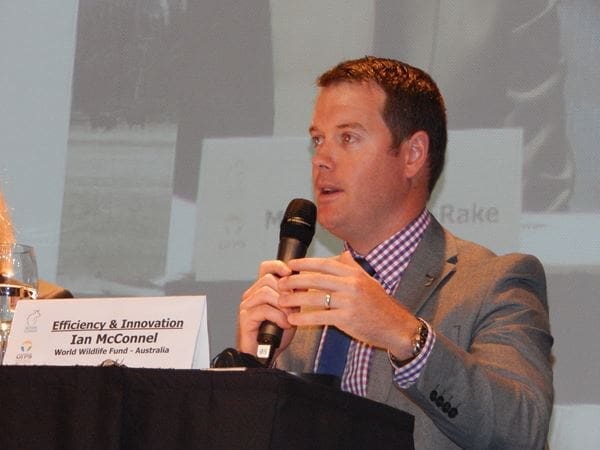MEMBERS of the Global Roundtable for Sustainable Beef have overwhelmingly approved global principles and criteria for defining sustainable beef and sustainable beef production practices at a meeting in Brazil this week.
More than 260 delegates from 19 nations, including Australia, are attending the GRSB’s global conference on sustainable beef in Sao Paulo.
Members of the global beef community, including prominent representatives from each segment of the supply chain, have worked collaboratively for the past 18 months as part of the GRSB to identify and define the core principles for sustainable beef production and delivery.
It’s important to note that nothing about GRSB’s work is meant to create a standard or mandate about how beef should be produced in any given region or country around the world – but simply to create a set of guidelines for the formation of such standards at a regional level, should stakeholders so choose.
The Global Roundtable for Sustainable Beef is a global, multi-stakeholder initiative developed to advance continuous improvement in sustainability of the global beef value chain through leadership, science and multi-stakeholder engagement and collaboration.
One of the key premises on which the principles were developed was that any definition of sustainable beef production would require that all aspects of the beef value chain were not only environmentally sound, but also economically viable and socially responsible.
The Roundtable includes five main stakeholder groups: producers and producer associations, the commerce and processing sector, retail companies, civil interest groups and national or regional roundtables. The group, some of the members of which are identified at the bottom of this article, includes some of the largest food, agriculture and retail companies in the world.
GRSB’s executive director Rory Petre said arriving at a common definition, which included five core principles and detailed criteria for sustainable beef, had been a difficult task, and one which had taken a “great deal of time and negotiation.”
“Our members are to be commended for their commitment to finding common ground and identify a clear path forward, as we work to improve the sustainability of the global beef chain,” he said.
GRSB defines sustainable beef as a socially responsible, environmentally sound and economically viable product that prioritises five key areas:
- Planet (relevant principles: Natural Resources, Efficiency and Innovation, People and the Community)
- People (relevant principles: People and the Community and Food)
- Animals (relevant principle: Animal Health and Welfare, Efficiency and Innovation), and
- Progress (relevant principles: Natural Resources, People and the Community, Animal Health and Welfare, Food, Efficiency and Innovation).
GRSB president Cameron Bruett said the passage of a global definition for sustainable beef was a “truly a momentous achievement”, not only for GRSB members, but for the entire global beef value chain.
“This definition provides a common platform and consistent approach to discuss the economic, social and environmental issues we face, irrespective of the region of the world in which one might be located,” Mr Bruett said.
Defining sustainable beef and beef production practices had required the dedication of GRSB members and external experts from each sector of the beef production chain, from cow-calf producers to retailers, he said.
GRSB’s unique approach also included input from representatives of several non-governmental organisations, civil interest groups, processors, allied industry and regional roundtables throughout the value chain.
More than 96 percent of the GRSB general assembly members voted in favour of the definition, principles and criteria this week. Every one of the five stakeholder groups – producer, commerce and processing, retail, civil society, and regional and national roundtables – voted in support of the definition.
“GRSB’s definition provides clarity to discussions about sustainability that have been nebulous in the past,” Mr Bruett said.
“It is our expectation that the Principles and Criteria will better enable members of our value chain to discuss beef sustainability clearly and identify the next steps in our collective journey of continuous improvement. If we are successful, each one of these steps will ultimately build consumer trust in our production practices, our products and our positive contributions to society.”
Mr Bruett said the next steps for GRSB would include working with regional and national roundtables to identify areas where improvements and efficiencies could be achieved.
He also stressed that nothing about GRSB’s work was meant to create a standard or mandate for how beef should be produced in any region or country.
“We know that mandated practices or a single, ‘one-size-fits-all’ approach to beef production will not work for our members around the world,” he said.
“Instead, it is our intention to work with the regional and national roundtables as they identify locally-focused solutions to meet the unique challenges they face in their region. We view our work as an exercise in empowerment, where people on the ground, who have a vested interest in the success of their local industry, their ecosystem and their community can achieve results that are relevant locally, and meaningful globally.”
Roll-out next year
Across the five categories dubbed ‘Principles’ by the GRSB, up to nine criteria were listed under each, that future supporters will have to adhere to. The language of many criteria points was deliberately left vague, with further specifics to come via ‘guidance’ reports beginning in the first quarter of next year.
For example, under Principle 1, Natural Resources, criteria like ‘improve air quality’ and ‘minimisation of greenhouse gas emissions’ were two that were written broadly to allow national groups to specify standards that producers in their markets could realistically meet, according to the Canadian Cattlemen’s Association’s manager of environment and sustainability, Fawn Jackson.
The GRSB plans to roll-out detailed advice on how producers can meet each criteria point by the first quarter of 2015.
The group will also begin helping national and regional beef roundtables as soon as next year to develop their own regionally-relevant standards for sustainable beef, which was the ultimate goal that motivated organisers to develop the criteria in a broad fashion on which individual markets could build.
“We deliberately avoided specifics of what we measure and the means of verification, knowing that it will vary widely from market to market, and must be set at a national or local level,” Rory Petre said.
National-level roundtable groups are already established in Canada, Colombia and Mexico, while Brazil’s Grupo de Trabalho da Sustentavel (GTPS) is the most advanced of any worldwide, and is already working with producers in multiple states.
Other countries with a group or association in development but not fully formed yet included Argentina, Paraguay, the US, the European Union and Australia, he said.
“So there are many making progress, and I expect more to come up in the next few years. GRSB can support other countries, certainly, to get started down this path.”
Companies don’t have to wait for the countries in which they operate to develop their own roundtables and sustainability mandates, and instead can adopt the GRSB principles as their own.
Vice president for corporate social responsibility at Marfrig’s Keystone Foods division, Ed Delate, said the standards and criteria could be used by a firm like Marfrig and passed down through its supply chains.
For global burger chain, McDonald’s, which in January announced it will begin using verified sustainable beef from 2016 (note, some, not all supply), the time is now to push for change in the industry, said Michele Banik-Rake, the company’s director of sustainability.
“We took that stance in January because we’ve always felt that the beef industry is quite sustainable, except for a few gaps, and we think it’s time to be able to show and measure that,” she said.
- GRSB’s newly devised Principles and Criteria Backgrounder can be viewed here, or visit GRSBeef.org
Who’s involved in the GRSB?
Here’s a sample of some of the more prominent members of the GRSB (full list accessible here):
- Retail sector – McDonald’s, Walmart, Woolworths
- Processing – Cargill, BPI, JBS, Lopez Foods, Marfrig, Tyson, OSI
- Producer representation – Cattle Council of Australia, Canadian Cattlemens Association, Beef +Lamb NZ, US National Cattlemens Beef Association, Earth Alliance Brazil
- Commerce – Allflex, Zoetis, Dow, Merck, Merial, Rabobank
- Civil constituency – World Wildlife Fund, Rainforest Alliance, Solidaridad.


